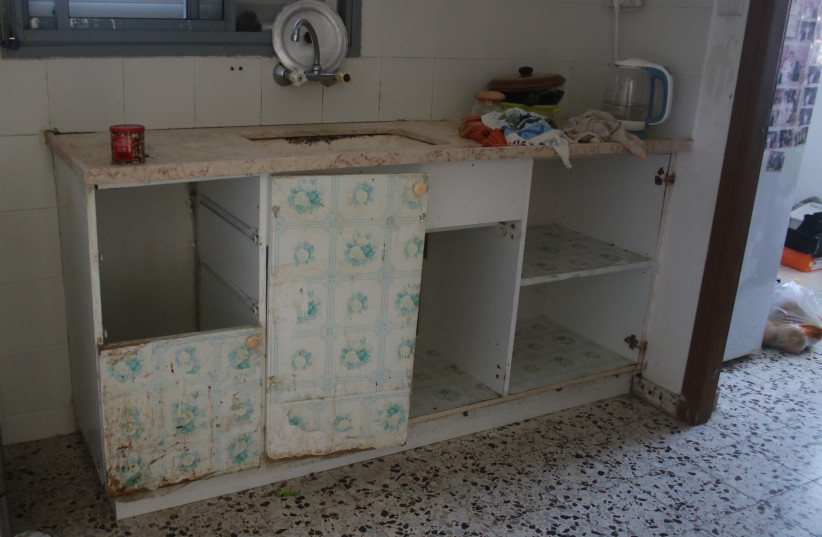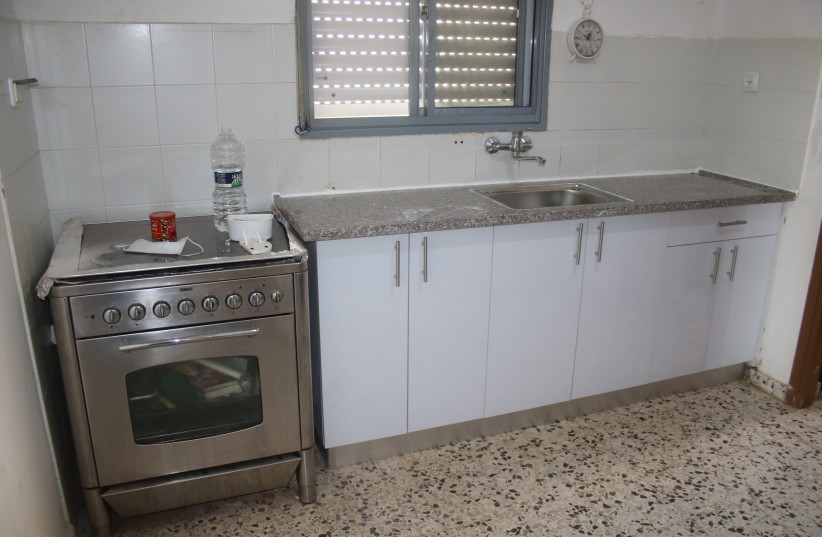In windows, on doorsteps, in malls and city squares, Israelis light Chanukah candles after dark this week. "It's ironic," says Irit Krokovsky, social worker at Tenufa Bakehila – Building Hope, the nonprofit that combats housing poverty in Israel, "In the darkest days of winter, when all we want to do is warm up inside, our communities turns on the lights outside. You'd think we would want a haven from the dark and the cold. But we take for granted that inside of our homes there's light and warmth, that the light we create – the miracles – need to show up out of doors."
Irit works with families who suffer from housing poverty – Israel's hidden housing crisis. These families see holiday lights as less ironic and more painful. Their homes are dark and in deep disrepair. In these families, children shower in cold water in the winter, they can't do homework at night because they have no working lights. Tenufa Bakehila is the largest home-repair organization in Israel and the only one that addresses both the source and repercussions of housing poverty. They combine intensive home repairs with social work support. Irit's job is to help families use repair of their physical homes as a catalyst for improvement in their welfare and quality of life.

The hidden housing crisis: homes that are dark and cold
While Israeli media and social activists grapple with the notorious "housing crisis," Tenufa Bakehila – Building Hope addresses the hidden crisis – housing poverty. Housing poverty afflicts tens of thousands of families in Israel. These families live in terribly dilapidated and unsafe homes. Many have no heat and some have kitchens so dark or dilapidated they can't make hot soup on a cold day. In winter, children return to dark homes after school. Their parents can't cook in the dark kitchen, and the children eat cold sandwiches and pull on sweatshirts and blankets to keep warm. In these homes elderly go to bed when night falls because they are afraid to fall in the dark. Many of these families have faulty plumbing. Young children, or elderly in their 70's and 80's, drag buckets of water to the bathroom so they can flush the toilet.

Tenufa Bakehila's repair staff do more than repair these homes. They wear the unofficial hat of deputy social worker. "We work in the family's most intimate space," Irit explains. "Our teams work in a home all day for several days." When they treat an apartment for mold, repair broken walls, paint, they enter every bedroom. They discover the teenager who is in bed all day, a silent dropout suffering from depression. They notice when pills sit out on a counter because a Holocaust survivor needs help with her medication. They may arrive early in the morning to replace a rotted kitchen and discover an 11-year-old boy folding up a cot and pajamas in the kitchen, his official "bedroom."
Irit helps repair staff to work appropriately with individuals in need, and she provides direct support for families. She is skilled at crisis evaluation and individuation of services. Her goal is two-fold, to fill gaps in families' existing welfare services, and to help families develop awareness of their own needs and gain the resources and skills to address them.
Greater need, greater potential
Irit explains that some of the most tragic circumstances are also the ones with the most potential. Recently, she helped a family with five young, including nine-year-old Arik who has cognitive disabilities and impaired hearing. When Arik was younger he suffered from frustration and rage. He destroyed furniture, kicked down doors, broke windows. His parents had no energy to care for their other children, barely enough energy to work, and no funds to repair the violent damage. While Tenufa Bakehila's repair team installed doors in the bathrooms and bedrooms, Irit met with the family. While the team repaired windows and, Irit reached out to social services and NGO's to get the family the help they needed to rebuild and thrive.
Before long, Arik was enrolled in an afterschool program that freed his mom to spend time with the other children, to sit for a few quiet minutes and recharge. Irit arranged for counseling to help the parents with skills for raising a child with special needs. She connected them with a support group and connected with another organization to have beds donated because the children were sleeping on the floor. Tenufa Bakehila's repair staff fixed the physical structure of the home, Irit replaced the desperation with energy and hope, and the family has begun a path towards a healthy and thriving home.
Bringing the Light Home
Tenufa Bakehila repairs over 500 dilapidated homes each year, bringing the light home for more than 2,000 Israeli of all ages: children, elderly, Holocaust survivors, single parent families, people coping with disabilities and illness, immigrants, and others in need. Tenufa Bakehila operates eight professional repair teams and collaborates with 20 municipalities.
"Repairing the home is crucial to a family's thriving," says Irit. "But we know that dilapidation is a symptom of crisis or challenge, and so we integrate social support as part of repairs. We want to help these families for the long term, so they can achieve a better quality of life. Poor housing has terrible effects on mental and physical health, on family functioning, on children's emotional and social development. The underlying causes of poverty lead to dilapidation, and dilapidation leads to anguish. Our job is to address both the cause and repercussions of the challenges, so we can replace darkness with light."
This Chanukah, Tenufa Bakehila is launching its Bring the Light Home Campaign to raise awareness about thousands of Israeli children who suffer from housing poverty and its repercussions. They are calling to those who enjoy stable, bright homes to help bring the light home to others.
Donate now to Bring the Light Home. Your support will improve the lives of thousands of children living in dilapidated homes.
To donate by phone call +972-2-679-3491. Checks can be sent to Tenufa Bakehila, Rashba 15, Jerusalem.
This article was written in cooperation with Tenufa Bakehila
